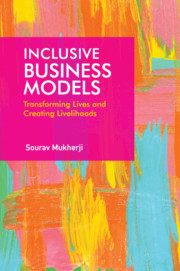Book contents
- Frontmatter
- Dedication
- Contents
- List of Tables
- List of Figures
- Preface
- Acknowledgements
- 1 Introduction
- 2 Vaatsalya Hospitals: Affordable Healthcare in Proximity
- 3 Gyan Shala: Providing Inclusive Education
- 4 Rang De: Creating a Platform for Social Investing
- 5 Labournet: Empowering Informal Sector Labourers
- 6 Selco: Inclusive Model for Energy Access
- 7 Hasiru Dala Innovations: Improving Lives of Waste Pickers
- 8 Reliance Retail: Creating Inclusive Supply Chain
- 9 International Development Enterprise (Ide) Nepal: Developing Smallholder Ecosystem
- 10 Ruralshores: Delivering Inclusive Service
- 11 Gujarat Narmada Fertilizer Company’s (Gnfc) Neem Initiative: A Social Business
- 12 Bringing it All Together
- References
- Index
7 - Hasiru Dala Innovations: Improving Lives of Waste Pickers
Published online by Cambridge University Press: 31 July 2021
- Frontmatter
- Dedication
- Contents
- List of Tables
- List of Figures
- Preface
- Acknowledgements
- 1 Introduction
- 2 Vaatsalya Hospitals: Affordable Healthcare in Proximity
- 3 Gyan Shala: Providing Inclusive Education
- 4 Rang De: Creating a Platform for Social Investing
- 5 Labournet: Empowering Informal Sector Labourers
- 6 Selco: Inclusive Model for Energy Access
- 7 Hasiru Dala Innovations: Improving Lives of Waste Pickers
- 8 Reliance Retail: Creating Inclusive Supply Chain
- 9 International Development Enterprise (Ide) Nepal: Developing Smallholder Ecosystem
- 10 Ruralshores: Delivering Inclusive Service
- 11 Gujarat Narmada Fertilizer Company’s (Gnfc) Neem Initiative: A Social Business
- 12 Bringing it All Together
- References
- Index
Summary
India faces a huge challenge in waste management, which is a direct consequence of industrialization and urbanization. Four hundred million urban Indians living in about 8,000 towns and cities generate 62 million tonnes (MT) of municipal solid waste annually. While solid waste management should be one of the basic services provided by municipal authorities in order to keep urban centres clean, almost all such bodies deposit solid waste in dumping grounds within or outside cities haphazardly. Thus, only 43 MT of waste is collected, 12 MT is treated, and 31 MT is dumped in landfill sites (Lahiry 2019). Reports have pointed out that there was potential for recovering at least 15 per cent of the waste generated every day in India, which could provide employment to about 500,000 waste pickers. In many cities, waste collection is done informally where waste pickers collect solid waste from doorsteps, sometimes against a collection fee, and derive income by selling the recyclables. Thus, the informal recycling industry plays a significant role in waste management and ensures that less waste reached the landfills.
However, the economic condition of thousands of waste pickers, who are the foot soldiers of this enormous and critical operation of waste management, is possibly the worst among all professions in the country. They operate in harsh working conditions and are exposed to health hazards, accidents and crises of all kinds. They live in slums, which often lack access to basic infrastructure, such as electricity, clean water and sanitation. They traditionally belong to the lower castes, have low social status and are exploited by contractors and intermediaries. Civil society, municipal authorities and law enforcement agencies view them with hostility, which has prevented them from being integrated with any kind of formal system. Studies indicated that the average life expectancy of a waste picker was 39 years, their income was less than a dollar a day and there was 33 per cent infant mortality among their families.
In this chapter, we discuss about Hasiru Dala Innovations Private Limited (HDI), a social enterprise that offers waste management services primarily to bulk waste generators in the city of Bengaluru.
- Type
- Chapter
- Information
- Inclusive Business ModelsTransforming Lives and Creating Livelihoods, pp. 160 - 181Publisher: Cambridge University PressPrint publication year: 2021



